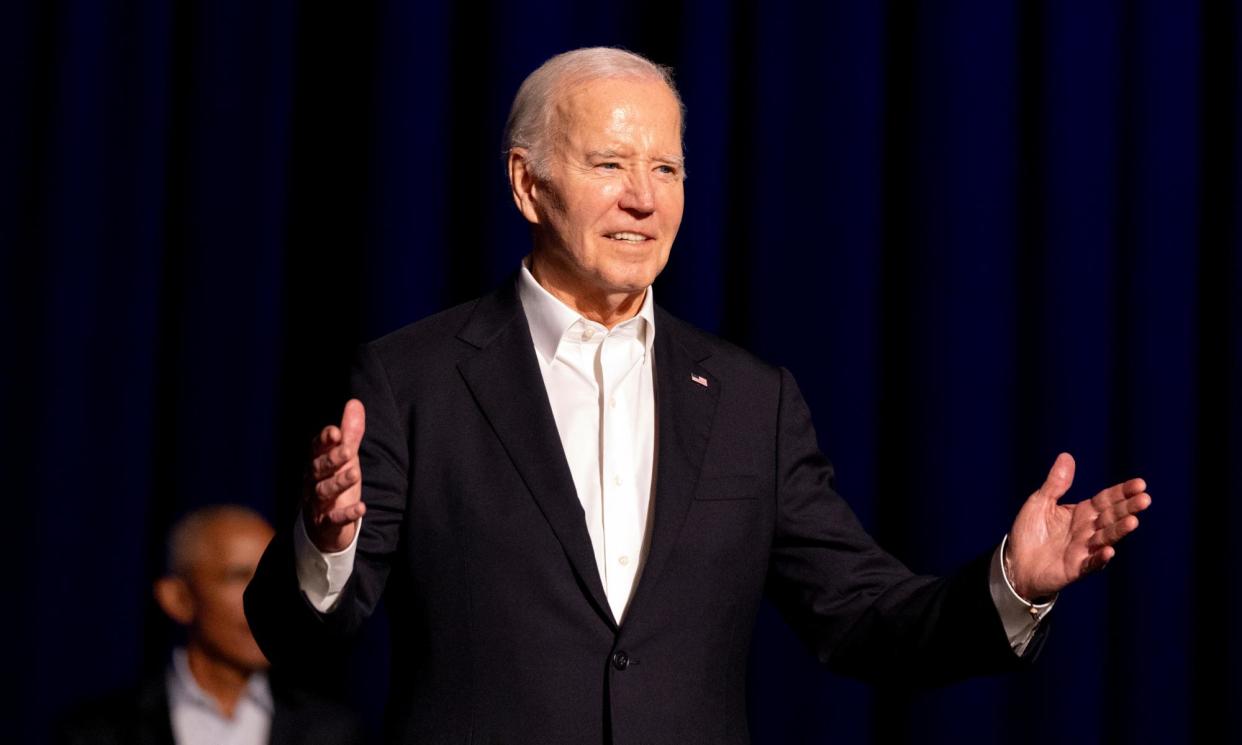Videos of Biden looking lost are a viral political tactic: ‘low-level manipulation’

Joe Biden wandered off.
Standing among the west’s major leaders in Italy last week, the US president turned away, seemingly in confusion, and had to be alerted back to the group to take a photo – at least, that’s what rightwing media showed.
“WHAT IS BIDEN DOING?” the Republican National Committee’s research Twitter account wrote.
In actuality, it was nothing strange at all. Biden had turned toward skydivers and given them a thumbs-up, a broader view of the video showed.
It happened again at a fundraiser with former president Barack Obama. Biden “appears to freeze up” on stage, the New York Post wrote, saying Obama had to lead Biden off the stage in the latest example of the president being “dazed or confused”.
A zoomed-out video of the incident showed Biden waving and taking in the applause from the crowd after a lengthy discussion moderated by late-night host Jimmy Kimmel.
For viewers of rightwing media or social media feeds tailored toward conservatives, these videos of Biden surface near-daily in an attempt to underscore one of the president’s key liabilities, his age.
They’re often selectively edited to make Biden look, well, old. They kick off a series of headlines about how his age or senility is showing, then another series of headlines about how the videos are created to mislead.
The videos, and the subsequent hand-wringing over them, show how bifurcated today’s political and social media ecosystems are. Few watch a full speech or a full newscast, instead getting a quick example of what they missed from an account they align with. Your view of a given event – of a speech by a president, or a campaign rally - is colored first, and often predominantly, by the way it’s presented by the people you follow.
An NBC News editor referred to these video news cycles as a reflection of the online media ecosystem this election, calling them “a bizarre Rorschach test in which some people see one thing and most everyone else sees something else”.
They also show that the looming threat of deepfakes – AI-generated content that makes people say or do things they haven’t actually done – doesn’t hold a candle to the much more common, and easier to create, cheap fakes, videos edited specifically to mislead.
“This old-fashioned, sort of low-level kind of manipulation has been perfectly capable of misleading and manipulating people for quite a long time,” said Bret Schafer, a senior fellow for media and digital disinformation for the Alliance for Securing Democracy.
While deepfakes or other AI-generated content would likely be flagged and potentially removed from social media channels for going against their policies, these selectively edited videos typically don’t break rules because, to some degree, all content is edited in some way, Schafer said.
The Biden administration derided the videos as cheap fakes made in bad faith and defended the president’s mental fitness, though at one point Karine Jean-Pierre, the White House press secretary, called the videos “deepfakes”, which they are not. That kicked off another round of criticism on the right, with people claiming Jean-Pierre was spreading misinformation herself.
The left isn’t immune from posting misleading images about Trump, either. One photo showing Trump holding his son’s hand claims the former president needed help walking off a stage, while a video showed he was actually shaking his son’s hand.
There are often similar videos of Trump posted either separately or in response to a Biden video news cycle – of the former president waxing on about sharks and electricity, or wandering away, or holding someone’s hand while walking. He notably got the name of his own doctor wrong in a speech over the weekend while challenging Biden to take a cognitive test.
In reality, both presidential candidates are old, a fact that doesn’t change. Trump is 78; Biden is 81. Whether you view them as prone to senior moments, incoherent and rambling, or slow on their feet relates mostly to your views on who they are – and the content you’re seeing about it.
The two candidates’ ages may create more of these gaffes, and the coverage of these gaffes gets extended because voters are concerned about the age of the next president. There seems to be a “little bit of a Ping-Pong game of who has the senior moment du jour”, Schafer said. Endless repetition of age-related criticisms can influence voters and reinforce concerns they have over fitness for office, which is why these news cycles, and promotion by both campaigns, continue.
These separate media ecosystems aren’t new this election cycle, though they create alternate realities for their viewers. It’s not just how something is covered, but whether it’s covered at all, Schafer noted. A viewer of some rightwing media could be served coverage of a story incessantly while it doesn’t make headlines in the broader press.
“It is highly problematic when we talk about having a shared sense of reality because that’s what the real function of democracy should be,” he said. “We have an agreed-upon set of facts, and then there’s a lot of interpretation of those facts.”
